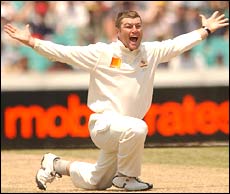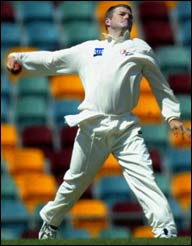Home > Cricket > World Cup 2003 > Columns > Daniel Laidlaw
Magilla is the man
December 19, 2002
Whether or not he is fit to play a meaningful part in the World Cup, the dislocated shoulder suffered by Shane Warne has again thrown into sharp focus the continuing question of who should be Australia's back-up spinner.
Warne, who considered retirement at the last World Cup following an early return from a shoulder reconstruction, will not last forever. Having learnt his lesson, it seems he will not jeopardise the rest of his career by attempting to come back too early. If that means skipping the World Cup, so be it.
The possibility of Warne not taking part in his team's World Cup defence in South Africa, then, means it is imperative the Australian selectors choose the right replacement as back-up. What was a relatively academic issue with a fit Warne is now one of significance.
Australia's provisional squad of 30 seems to reflect the developmental status any reserve spinner would have had. Off-spinner Nathan Hauritz and leggie Cameron White were the two inexperienced specialists selected, with Brad Hogg the left-arm all-rounder. It was Hogg who was selected for Australia's last one-dayer before the Ashes resumes, suggesting he has emerged as the front-runner to go to South Africa as cover for Warne.
 One other player, however, has been overlooked. While Steve Waugh's omission from the provisional squad drew most publicity, it was the absence of leg-spinner Stuart MacGill that was most surprising. The 31-year-old stands as the most unfortunate man in Australian cricket at the moment. A quality bowler who likely would have been an international veteran in a different era, MacGill has had the misfortune of bowling leg-spin in the same age as Shane Warne. Excelling from limited opportunities, he has been a victim of both circumstance and selectorial policy. Whenever Warne has been injured, MacGill has starred, most recently in the 2000/'01 season against West Indies when he claimed 16 wickets at 31 from four Tests. Upon Warne's return, however, he has always faded back into obscurity.
One other player, however, has been overlooked. While Steve Waugh's omission from the provisional squad drew most publicity, it was the absence of leg-spinner Stuart MacGill that was most surprising. The 31-year-old stands as the most unfortunate man in Australian cricket at the moment. A quality bowler who likely would have been an international veteran in a different era, MacGill has had the misfortune of bowling leg-spin in the same age as Shane Warne. Excelling from limited opportunities, he has been a victim of both circumstance and selectorial policy. Whenever Warne has been injured, MacGill has starred, most recently in the 2000/'01 season against West Indies when he claimed 16 wickets at 31 from four Tests. Upon Warne's return, however, he has always faded back into obscurity.
MacGill has also suffered from the selectors' reluctance to play two leg-spinners together. While Warne and MacGill have occasionally been paired together, most recently against South Africa in Sydney last season when MacGill had match figures of 7/174, when conditions have suited spin the selectors have generally opted for off-spin to complement Warne. The reasoning that two bowlers predominantly turning the ball away from the bat allows batsmen to adjust and thus negate their effectiveness does not really stand up to scrutiny, as they are two distinctly different bowlers.
Nevertheless, when the squad to play Pakistan in October was chosen, it was young off-spin Nathan Hauritz, not MacGill, who was preferred.
An attacking leg-spinner who can turn the ball even further than Warne, MacGill was reportedly excluded from the provisional squad because his high economy rate did suit Australia's commitment to containment in the middle overs. If MacGill's relative lack of economy does not match Australia's strategy, then the strategy is in need of immediate reform, for MacGill is the most obvious like-for-like replacement for Warne they possess.
In 17 Tests, MacGill has taken 82 wickets at 25. Perhaps even more relevantly, he has six wickets at 17.50 from only three ODI outings. Despite a propensity to bowl loose deliveries more often than is preferable, understandable for a non-Warne leggie, MacGill has nevertheless excelled in limited-overs cricket. In 51 'List A' games, he has 94 wickets at 21.70, at the exceptional strike rate of 27.1. It is the economy rate that concerns team hierarchy, though: 4.79, including 5.46 for NSW this season.
What the selectors must realise is that when a bowler takes wickets at MacGill's frequency and average, economy rate is a secondary consideration.
Wicket-taking bowlers are a precious commodity at any level and their value has been proven in one-day cricket. Brett Lee has an economy rate of 4.8 yet his value, when on form, is undeniable. Waqar Younis and Shoaib Akhtar have economy rates of 4.67 and 4.5 respectively, yet one is one of the greatest limited-overs bowlers ever and the other is on pace to become one. Bowlers with extra potency, who can strike during the middle overs while teams are typically accumulating in safety, invariably reduce the run rate anyway. Nothing contains like
wickets. So if a higher-than-ideal economy rate is acceptable for a fast bowler, why not a spinner?
 Also, Australia must accept they are unlikely to find a traditional leg-spinner who will ever possess Warne's control. Hauritz and White are both bowlers who theoretically make safe, containing options. But while they may be lower risk, they are certainly lower reward, as they do not at this stage of their careers match MacGill's strike potential. With the under-rated Darren Lehmann continuing to prove highly effective with his left-arm tweakers anyway, it's not another defensive spinner Australia needs but a genuine replacement for Warne, which they have.
Also, Australia must accept they are unlikely to find a traditional leg-spinner who will ever possess Warne's control. Hauritz and White are both bowlers who theoretically make safe, containing options. But while they may be lower risk, they are certainly lower reward, as they do not at this stage of their careers match MacGill's strike potential. With the under-rated Darren Lehmann continuing to prove highly effective with his left-arm tweakers anyway, it's not another defensive spinner Australia needs but a genuine replacement for Warne, which they have.
What also needs to be taken into consideration is the fact that fellow contenders South Africa and Pakistan are two of the world's weakest teams against leg-spin bowling. Facing either of those two in the later stages of the World Cup with MacGill, like Warne, would be a definite advantage.
It's strange that while MacGill's Test record should make him a certainty for the Boxing Day and New Year's Tests, his brief ODI performances don't seem to warrant him further consideration. MacGill played all three of his ODIs in the '99/'00 season substituting for Warne, taking 4/19 on debut against Pakistan with a worst performance 1/48, yet has never been heard from again at ODI level in the nearly three years since.
There is, of course, a risk in selecting him. On a bad day, it is eminently possible MacGill could get belted and become a liability. That, though, is the nature of the game. When Australia were heading to defeat in the last World Cup semifinal, it was not a containing bowler they needed, it was a wicket-taker. Warne was that bowler, and he stepped up. MacGill could do the same.
Despite his failure to be considered so far, logic dictates that Australia draw from outside their provisional squad to use MacGill as cover for Warne.
If 'Warney' can't make it, 'Magilla' is the man.
More Columns
Schedule | Interviews | Columns | Discussion Groups | News | Venues